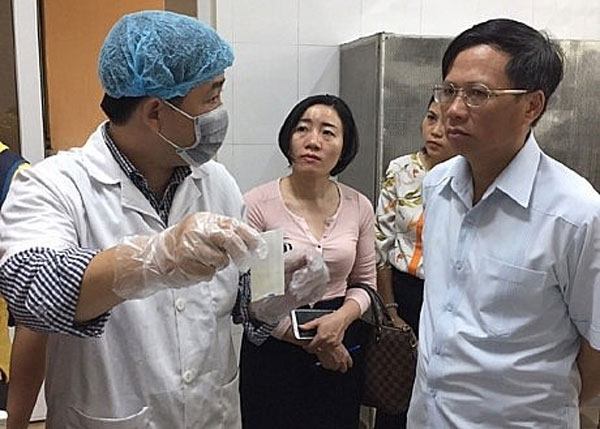VietNamNet Bridge – Parents in the capital city are worried about their children’s health after plant protection residues were found in vegetable samples at the Hoang Liet Kindergarten in Hoang Mai District last week.

|
|
The Hoang Mai District People’s Committee on 19 October conducted an inter-sector inspection team to check food safety in eight schools in the district.— Photo vtc.vn |
Tran Quy Thai, Vice Chairman of the Hoang Mai District People’s Committee, said that on October 19, he led an inter-sector inspection team to check food safety in eight schools.
The unannounced inspection, which included immediate testing in a specially-equipped mobile truck, found plant protection residues in a sample of green vegetables, mung toi, or Ceylon spinach, taken from the Hoàng Liệt Kindergarten. The vegetable hadn’t been processed for cooking when it was taken for testing. Further testing is being done, officials said.
Thai said that the team recorded its finding, and officials of the Hoang Mai Health Department and other agencies visited the Viet Nam Agriculture and Foodstuff Export-Import Company, which supplies foodstuff to the school and took samples for testing.
On Monday, the district’s economic department reported that the company had signed a contract for vegetable and fruit supply with the An Sinh Hi-tech Joint-Stock Company that located at Dang Xa, Gia Lam District.
The result of inspections at the An Sinh company showed that 57kg of Ceylon spinach came from a farming household that is a member of a safe vegetables growing group.
Inspectors have taken samples of vegetables grown by this household for further testing.
Parental concern
The Hoang Liet Kindergarten has 1,000 children aged three to five. The inspection and its findings have parents worried about the quality of food being served to their children.
Nguyen Thi Hong Loan, mother of a four-year-old girl, said: "At the office, I can check and select where to get safe food, but in schools, children are completely dependent on the teachers.”
“When I heard about the chemical-infected vegetables, it hurt me, because the children are so small. How will their health be affected if they consume pesticides every day? "
Another mother, Tam Anh, who lives on Hoang Mai District’s Linh Nam St., said that she wanted to prepare lunch for her son, but the kindergarten administrators didn’t allow it.
Tam Anh said parents in the city now have many ways to prepare clean meals, by growing vegetables and raising chickens by themselves, buying foodstuff from safe-food places or getting them from trusted relatives in rural areas.
Why did the school sign a food contract with a company that wasn’t a safe-vegetables grower, she asked.
"If my son is accidentally poisoned or gets sick after plant protection ingestion for a long time, he and his parents are the ones to suffer,” she said.
Hoang Thanh Huong, head of the pre-school division of the city’s Education and Training Department, said the district People’s Committee has asked the economic and health departments to check and report on the situation to her department as well as the Ha Noi People’s Committee.
Huong said the district administration was responsible for inspecting and evaluating food suppliers to schools in the area. The school principal was responsible for assigning inspectors to check food origins and when there are problems with the food, the food supplier would be held responsible for any damage caused, she said.
So far, Nguyen Thi Hong Nga, principal of the Hoang Liet Kindergarten, is yet to respond on this situation.
Tran Quy Thai, deputy chairman of the Hoang Mai District People’s Committee, said district authorities were very concerned about the safety of all 30,000 students in the area. However, while checking food in school kitchens, it was difficult to detect those that contain excess chemicals because of the lack of special equipment, he said.
Lack of equipments
Regarding the plant protection contamination found at the district authorities had to register with the city’s Health Department for using the mobile truck equipped with food-testing equipment. Since the city has just three of these trucks, district authorities have to register several weeks in advance.
Tran Ngoc Tu, Director of the city’s Food Safety Department, agreed that having just three mobile food-testing trucks serve millions of residents was not sufficient.
He suggested that schools themselves check food quality, deploying several steps including checking the origins of the materials and ensuring fresh food like meat and fish have needed quarantine papers. The schools should also arrange staff who are qualified to check food quality and preservation conditions. The cooking process must also be checked regularly, he added.
Unfortunately the lack of food hygiene in the kindergarten is not an isolated incident.
In mid September, Bui Kim Thuy, principal of the city’s Hoang Hoa Tham Primary School, confirmed that failure to keep food trays clean had led to a third-grade student finding maggots in his/her lunch tray. She sought to allay concerns about food safety, saying the worms were found not in the food, but on the food tray.
She said the reason was that after lunch on Friday, the dishwashing staff put aside two trays that were stuck together. The trays had been left unwashed for two days, she said.
Nguyen Dac Hung, head of the Ba Dinh District’s Education and Training Office, said that as soon as the plant protection contamination came to light, an order was sent to all schools that organise meals for students in canteens that they had to strictly comply with food hygiene and safety regulations, and totally avoid products of unknown origin.
Source: VNS
| related news |